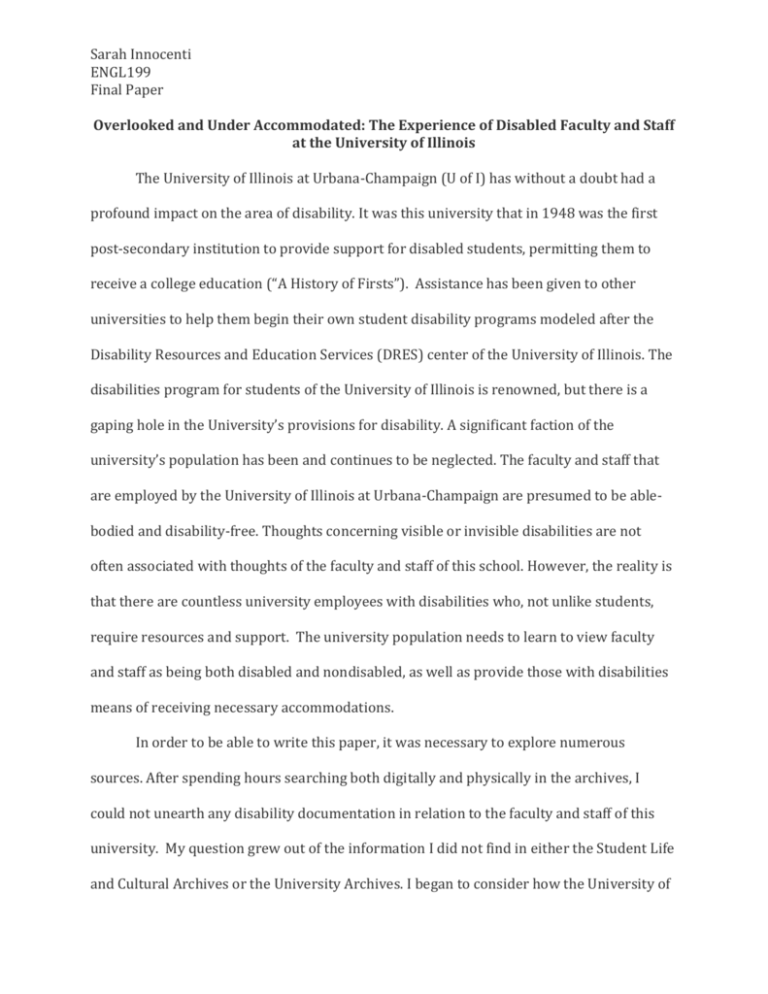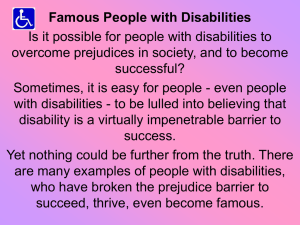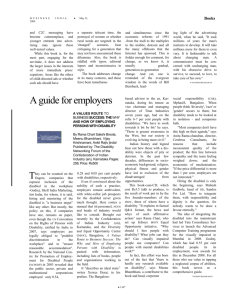Innocenti Final Paper - Ideals - University of Illinois at Urbana
advertisement

Sarah Innocenti ENGL199 Final Paper Overlooked and Under Accommodated: The Experience of Disabled Faculty and Staff at the University of Illinois The University of Illinois at Urbana-Champaign (U of I) has without a doubt had a profound impact on the area of disability. It was this university that in 1948 was the first post-secondary institution to provide support for disabled students, permitting them to receive a college education (“A History of Firsts”). Assistance has been given to other universities to help them begin their own student disability programs modeled after the Disability Resources and Education Services (DRES) center of the University of Illinois. The disabilities program for students of the University of Illinois is renowned, but there is a gaping hole in the University’s provisions for disability. A significant faction of the university’s population has been and continues to be neglected. The faculty and staff that are employed by the University of Illinois at Urbana-Champaign are presumed to be ablebodied and disability-free. Thoughts concerning visible or invisible disabilities are not often associated with thoughts of the faculty and staff of this school. However, the reality is that there are countless university employees with disabilities who, not unlike students, require resources and support. The university population needs to learn to view faculty and staff as being both disabled and nondisabled, as well as provide those with disabilities means of receiving necessary accommodations. In order to be able to write this paper, it was necessary to explore numerous sources. After spending hours searching both digitally and physically in the archives, I could not unearth any disability documentation in relation to the faculty and staff of this university. My question grew out of the information I did not find in either the Student Life and Cultural Archives or the University Archives. I began to consider how the University of Sarah Innocenti ENGL199 Final Paper Illinois assists its employees who have disabilities, which require them to receive specific accommodations. There is no DRES-equivalent facility for faculty and staff. After reading an article authored by an invisibly disabled faculty member, Dr. Susan G. Davis, I decided to interview her to gain more information about her specific experience as a disabled professor of the University of Illinois (Davis, “Faculty with Disabilities, a Report”). She proved to be an invaluable resource in the course of developing my research for this paper. In addition, My Body Politic by Simi Linton provided another perspective of a disabled college professor—visibly disabled and confined to a wheelchair as a result of being hit by a car while hitchhiking (Linton, My Body Politic). The Body Silent by Robert Murphy was especially useful in that it tells of the metamorphosis of a university professor from a nondisabled to disabled individual (Murphy). An unexpected resource proved to be Michelle Bolden’s presentation concerning the Office of Equal Opportunity and Access (OEOA). As assistant ADA/EEO coordinator, Ms. Bolden provided the University of Illinois’ perspective on this topic (Bolden). Through the use of these vital resources, as well as a few others, I have been able to compose this research paper. A substantial aspect of the issue of recognition of university faculty and staff members with disabilities is how they view themselves. There appears to be a common theme in which the term “university professor” is not one that is associated with disability—neither visible nor invisible. After reading My Body Politic and conducting the interview with Dr. Davis, it is apparent that many disabled professors, themselves, think of professors as being able-bodied and free of disabilities (Davis, Personal interview; Linton, My Body Politic). The question becomes how did this perception arise and why? It is clear Sarah Innocenti ENGL199 Final Paper that disabled professors are not hindered in their abilities to teach students; thus, why are they not thought of as instructors in the same manner as able-bodied individuals? It is vital to consider the self-perception of faculty and staff with disabilities. Disabled professors often times have difficulties in viewing themselves as professors, hindered in doing so by their disabilities. Prior to the age of twenty-three, Simi Linton was a nondisabled individual, who also had no prior professional goals of becoming a university professor. She states in her novel, My Body Politic, that the desire to become a professor only arose following becoming disabled. “I had talked myself out of and then into becoming a teacher, worried that I would be unacceptable as a college professor, a spectacle, a low-to-the-ground inferior version of a lofty academic…One thing I do know is that I hadn’t even thought about becoming a professor, or a professional anything, in those years before the accident. I had become more purposeful, more ready to do something important since” (Linton 171, My Body Politic). Simi convinced herself that because she was physically confined to a wheelchair, students and other faculty members would not accept her as a college level instructor. Her shorter stature as a result of being physically disabled made her unable to see herself as being a professor—and she believed others would share her view. The crucial concept seems to be that not being able-bodied does not make a person less able-minded. Simi failed to consider a critical characteristic of college professors: academic intelligence. Her expertise in a specific subject or field was not at all affected by her disability. Simi clearly had an idea of what she considered to be the attributes of a typical college professor, in which she did not incorporate disability or a wheelchair. “A Sarah Innocenti ENGL199 Final Paper lofty academic” does not have a disability, at least in Simi’s mind (Linton 171, My Body Politic). Simi first had to accept herself as a disabled individual, before she could even begin the journey of thinking of herself as a disabled college professor. “I didn’t really identify myself as a disabled woman for many, many years” (Linton, "Interview with Simi Linton."). Similar to the acceptance required when a person first becomes disabled—after having been able-bodied—one has to learn to accept that having a disability is not an obstacle in the path to becoming a professor. Simi Linton’s mindset on this manner is all too common amongst disabled university professors. However, it is important to recognize Simi Linton for her significant accomplishments as a successful, disabled professor. She was able to overcome obstacles placed in her path and become a professor. Disabled faculty members of the University of Illinois should view Simi as a prototype—a successful professor who happens to also be disabled. Simi’s experiences demonstrate that a disability does not have to stand in the way of a fulfilling career as a scholar—an encouraging message that disabled faculty members on this campus can benefit from. Some of the inability that professors experience in recognizing themselves as professors with disabilities may actually be desired. If they, themselves, do not acknowledge they possess a disability, then they can avoid acquiring the “disability” label. These professors are faced with a difficult decision to make: disclose their disability— risking discrimination—or denial of the fact they are scholars with disabilities. In my interview with Dr. Davis, she presented the concept that it is not that disabled professors have trouble accepting the idea of a disabled professor—as Simi Linton did—but rather that the university indirectly forces them to hide their disabilities to avoid a superfluous Sarah Innocenti ENGL199 Final Paper label. “I know faculty who don't want to be labeled "disabled…" They feel that it would be held against them in their careers” (Davis, Personal interview). Dr. Susan G. Davis, a professor in the Department of Communications at the University of Illinois at UrbanaChampaign, authored an article concerning the University’s lack of recognition and accommodation of faculty and staff members with disabilities. In this article, she openly acknowledged her own—invisible—disability, chronic hand and arm pain. She stated in her article that she was unsure if she could continue to work following her diagnoses with a disability. It seems more obvious, as compared to Simi Linton, why Dr. Davis may have questioned her ability to continue as a professor at the University of Illinois; her disability had the potential to affect her ability to teach—specifically grading, writing, and typing. Initially, Dr. Davis had a difficult time accepting her disability and seeing herself as capable of working as a disabled professor. Dr. Davis chose to disclose her disability to the university in order to try and receive the accommodations she requires. “…I have not felt that it was held against me. On the other hand, I have had to accept that I won't publish at the rate that I want to publish. It's very emotionally hard to accept that you thought you were steaming along and there was going to be a third book, and a forth book, and a fifth book; and maybe there will be a third book down the line. I think that that is a very, very painful thing to accept, and at the same time be worried that maybe people will treat you as less either because of that or because you have to ask for help. It's very hard.” It seems that while she was able to eventually see herself as a disabled professor, she still struggled to accept having her disability. She, too, feared the potential labeled that could have been placed upon her following her disclosure Sarah Innocenti ENGL199 Final Paper of her chronic hand and arm pain. However, Dr. Davis fortunately did not receive negative feedback as a result of opening up about her disability (Davis, Personal interview). In addition, Michelle Bolden of the OEOA stated how many disabled faculty members call her with fears of being labeled or ostracized if they reveal their disability. They do not want to receive “special treatment”—that they actually need and deserve—as a result of having a disability (Bolden). It seems to be a shared belief among disabled faculty and staff that they will be looked down upon by others for having a disability, thus, resulting in their lack of acceptance of themselves as disable professors. When the effort that has been exerted by two professors is equivalent, the fact that one is disabled should not at all influence one’s perception. In addition, the negative connotation associated with disabled professors often causes them to avoid seeking accommodations that they both require and deserve. However, even if accommodations are requested, the process of approval has frequently been tedious for disabled professors. The process of faculty disability accommodation requests at the University of Illinois at Urbana-Champaign is not simple. The university reserves the right to deem an accommodation unnecessary, unreasonable, or an “undue hardship” to the university. “A reasonable accommodation is any modification or adjustment to a job, practice, policy, or the work environment that allows a qualified individual with a disability to participate equally in an employment opportunity.” This makes it quite challenging for university faculty and staff to obtain the accommodations they need as a result of having a disability. It may seem that the university is in control of the accommodations that are actually Sarah Innocenti ENGL199 Final Paper provided and can deem a request an “undue hardship;” however, the law is superior. Michelle Bolden noted that, ultimately, the university would be defying the law if it were to deny disabled faculty necessary accommodations (Bolden). There is a gap between the University of Illinois’ policies and the law that needs to be resolved. Nevertheless, the rejection of an accommodation request by the university does not lead to a dead end for disabled faculty and staff. The process of appealing an accommodation request once denied is difficult, according to Michelle Bolden, a university employee of the OEOA who is in charge of accommodations for disabled university faculty and staff (Bolden). Based on Dr. Davis’ experiences with the OEOA, it seems that obtaining essential modifications is no easy feat. “[The OEOA] at times said that I need an accommodation and other times it said I didn't…they've denied them and then they've granted them. And then they've denied them and they've granted them. So, don't ask me why.” In my interview with Dr. Davis, I learned that she has to submit the same accommodation request each semester, allowing the university to change its decision concerning an accommodation—without a clear explanation. Dr. Davis stated, “It's a process of continually requesting; I mean, almost every semester I have to go through a process of reminding people that I need accommodations and arranging what that accommodation will be” (Davis, Personal interview). It seems the university is creating a hassle for itself and for its disabled faculty and staff concerning this matter. However, when I questioned Michelle Bolden concerning repeat faculty accommodation requests, she explained that in compliance with the ADA Amendments Act, Sarah Innocenti ENGL199 Final Paper a repeat accommodation request would not be necessary as long as the disability remains unchanged (Bolden). Due to time constraints, I was unable to delve into this issue further to solve the discrepancy. However, at the very least, it seems to be a problem with communication between faculty members with disabilities and the OEOA. For faculty with disabilities to easily obtain the accommodations they require, solid communication with the OEOA is essential; and it seem this often does not occur. There needs to be a resolution to this communication issue in order to help streamline this process. The level of difficulty of the process of obtaining a necessary accommodation for a disability affects a person’s willingness to submit a request. In Dr. Davis’ article on faculty disabilities at the University of Illinois, she comments, “I have heard stories of disabled faculty members having to buy their own office equipment and adaptive technologies. I had to research my own adaptations and find knowledgeable experts to help me with them— the U of I has no office dedicated to helping faculty with these occupational technology issues, although it has support programs for disabled students” (Davis, “Faculty with Disabilities, a Report”). Disabled faculty members are already at a disadvantage, and the accommodations provided to them by the university are supposed to aid in leveling the playing field. It seems that disabled faculty and staff are even further burdened by having to either provide their own accommodations or seek out others who can help, which can be quite challenging. Shouldn’t this be the university’s responsibility—the OEOA’s responsibility—after it receives a request for a necessary accommodation? The OEOA of the University of Illinois should consider the accomplishments that were brought about at Colombia University via the collective efforts of disabled faculty and Sarah Innocenti ENGL199 Final Paper the Office of Equal Opportunity and Affirmative Action. In The Body Silent, Robert Murphy, author of the novel and professor at Columbia, writes of the strides he made in obtaining accommodations from Colombia University. Murphy was appointed to chair a committee that would address the issues surrounding accessibility—a form of accommodation. In this case, Colombia publicized its desire to abide by the law and took measures in order to ensure it did so—like the creation of a specialized committee. The president of Colombia during that time, William McGill, reiterated that “…the university was seriously concerned with compliance with the federal statue…” (Murphy 152). The director of Colombia’s Office of Equal Opportunity and Affirmative Action was involved and played a significant role in this committee. Great success was achieved at Colombia via this committee. It will be the responsibility of the OEOA of the University of Illinois and disabled faculty members to improve their communication in order to effect change. The University of Illinois would not have achieved the high quality reputation that is has without its faculty and staff. Because they are so vital to the university, it is important to meet their needs, especially when the law requires it. The disabled faculty and staff that are employed by the university need to be appreciated, accommodated, and cleared of all potentially negative labels. Regardless if the disability is visible or invisible, a disabled faculty member should have the same prestige as a non-disabled faculty member. Furthermore, access to the accommodations required in order to adequately perform the core tasks of a job is essential for disabled faculty and staff. The future for the faculty and staff of the U of I who are disabled looks to be quite promising. Sarah Innocenti ENGL199 Final Paper Fear and shame about being disabled should not be the barrier that keeps a person from achieving his/her dreams of becoming a professor. In order to remove the labels that are often placed on disabled faculty members, I recommend that the University of Illinois focus its efforts on awareness. The university population needs to know that there are disabled faculty members on campus and recognize that they are just as capable as nondisabled faculty members. This will hopefully remove the stigma attached to disabled professors. In addition, I also recommend the formation of a committee for the purposes of advocacy and allowing the collective voice of disabled faculty members to be heard by the university. This would serve to help satisfy faculty and staff with disabilities, as well as allow the OEOA to better understand their needs. It is these small strides that can be made that have the potential to prompt immense change. Since this research project only spanned a single semester, there were time constraints that limited the amount of information I was able to gather. I was not able to find any background information or previous research that had been done concerning faculty with disabilities at the University of Illinois. Furthermore, I would have liked to find other disabled faculty members to interview in addition to Dr. Davis to gain a broader perspective. However, there was no clear method to finding other disabled faculty members that work on this campus. Yet another limitation in my research involved the OEOA. Dr. Davis provided information about her experience with the OEOA, which occurred at a time when Michelle Bolden was not an employee. I was unable to find what, if any, changes had been made since the time when Dr. Davis had contacted the OEOA. Further research into faculty disabilities at the University of Illinois at Urbana-Champaign Sarah Innocenti ENGL199 Final Paper is vital. To continue this research, more disabled professors need to be identified—in an appropriate manner—and interviewed. It would also be helpful to know what strides Michelle Bolden has made in improving the OEOA since she was hired in the beginning of 2012. Furthermore, it would be helpful to identify a university with a strong faculty disabilities program to serve as a model of a successful system. Further research is absolutely necessary in order to identify the issues and improve the experience of disabled faculty and staff members at the University of Illinois. Sarah Innocenti ENGL199 Final Paper Works Cited “A History of Firsts.” Disability Resources & Educational Services. University of Illinois at UrbanaChampaign, n.d. Web. 10 Apr. 2012. <http://www.disability.illinois.edu/history-firsts>. Bolden, Michelle H. “Office of Equal Opportunity and Access.” English Building, University of Illinois at Urbana-Champaign. 12 Apr. 2012. Class presentation. Davis, Susan G. “Faculty with Disabilities, a Report.” Campus Faculty Association. N.p., 27 Feb. 2012. Web. 2 Mar. 2012. <http://cfaillinois.org/2012/02/27/faculty-with-disabilities-a-report/>. Davis, Susan G. Personal interview. 29 Mar. 2012. "Disability Accommodation." Office of Equal Opportunity and Access. University of Illinois at Urbana-Champaign. Web. 10 Mar. 2012. <http://oeoa.illinois.edu/disability.html>. Linton, Simi. "Interview with Simi Linton." SimiLinton.com. The Kennedy Center, Aug. 2006. Web. 8 Apr. 2012. <http://www.similinton.com/simi_docs/pdf/KennedyCenterOpeningStages.pdf>. Linton, Simi. My Body Politic: A Memoir. Ann Arbor: University of Michigan, 2007. Print. Murphy, Robert F. The Body Silent. New York: Henry Holt and Company, 1987. Print.








